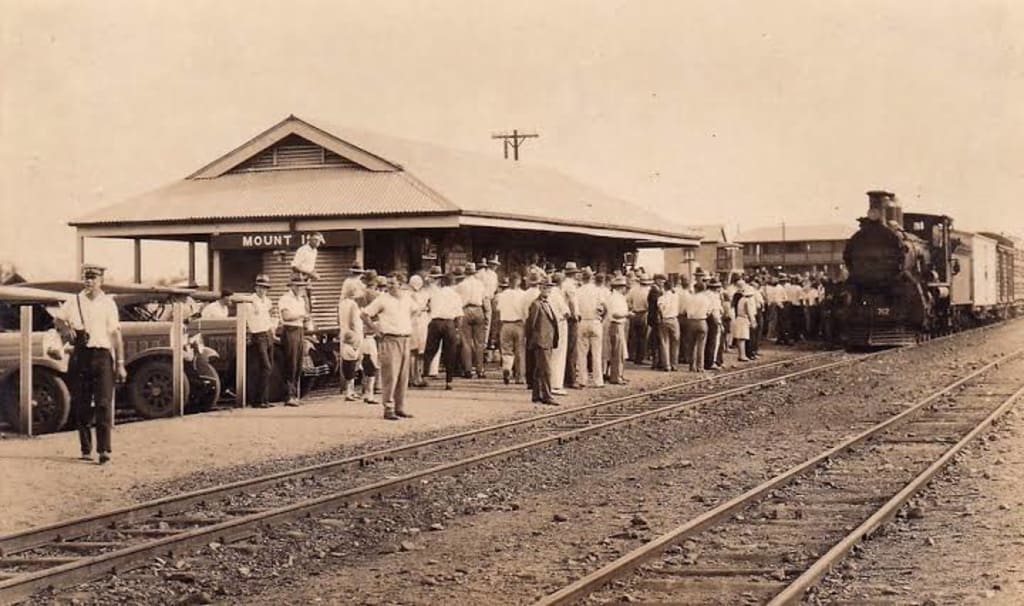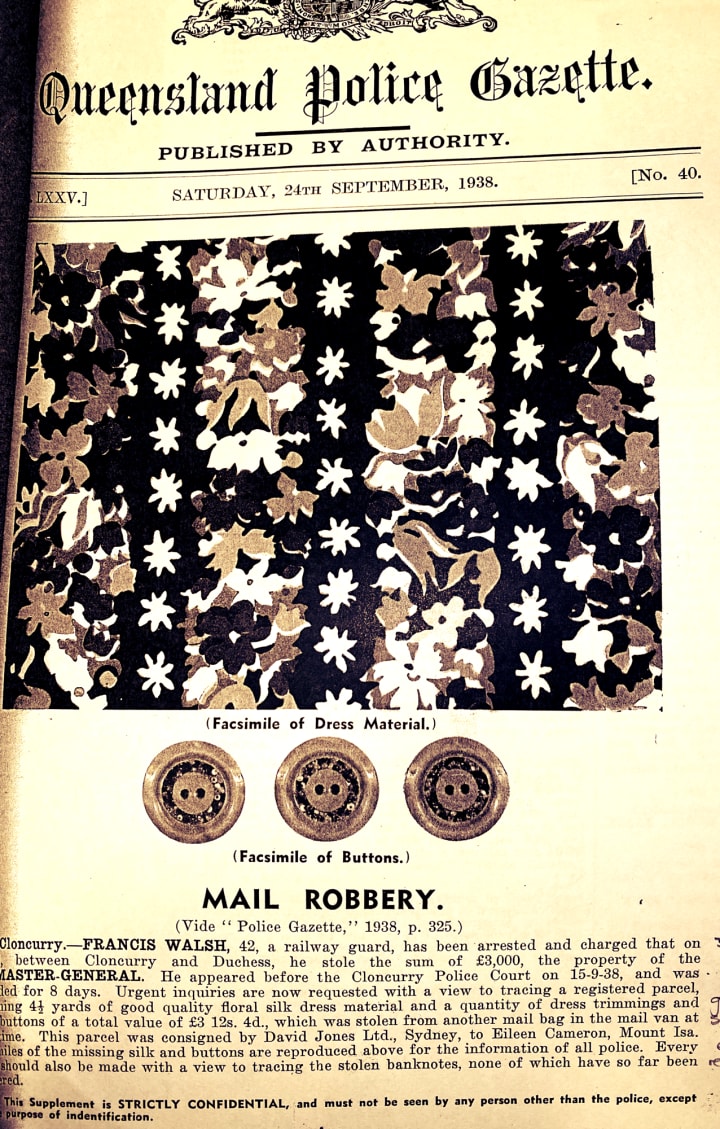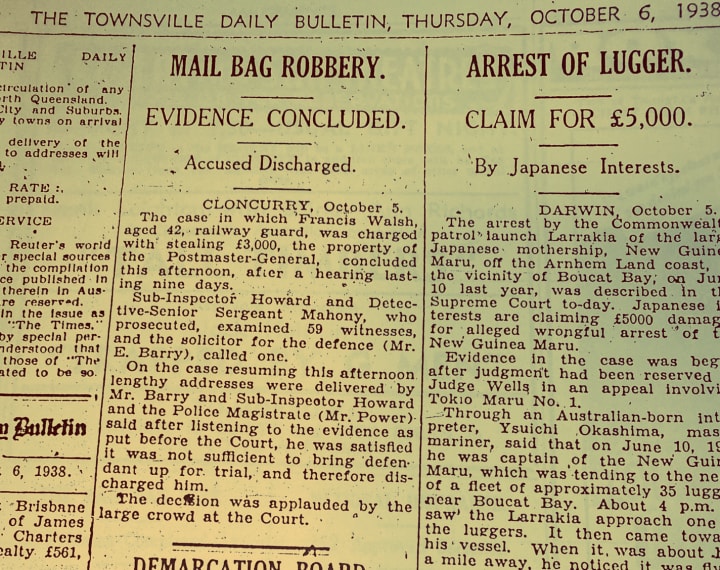The 1938 Mount Isa Train Robbery
A tale of outback cunning

For those that don’t know Western Queensland in Australia, it’s a harsh environment. The weather is hard, the ground is hard, the people are hard.
Also, solving crimes in that area is just as hard. Mount Isa is the city at the centre of this rugged and unforgiving area, a town that grew around the mine following the discovery of a significant copper deposit in 1901. The Guinness Book of Records lists it as the largest city in the world, even though today the population is only 21,000. The fact remains that the gazetted city area is a total of 40,977 sq. km (15,821 sq. mi), even though a vast amount of that land is uninhabited.
In 1938, a lot of the work of the police was focussed on the miners from the camps getting drunk and starting fights. There were no major crimes, because most people in town worked for the mine, or worked at businesses that were supported by the mine. Then, on the 31st of August that year Mrs Eileen Cameron went to collect from the train station a parcel she had purchased from David Jones Ltd in Sydney, some 4 ½ yards of good quality floral silk dress material and a quantity of dress trimmings and buttons. There are not records on what Mrs Cameron intended to use this material for, perhaps to make a new dress for an upcoming ball or other social event. However, when the “42 Up” train arrived in Mount Isa it was discovered that the mail bag containing this material.
While this discovery would have been considerably crushing for Mrs Cameron, even more disturbing for the entire Mount Isa region was the subsequent discovery that another mail bag was also missing. This bag contained £3,000 (Australian) which is close to $276,909 (Australian) today. It was the fortnightly payroll for the mine, and somewhere between Townsville and Mount Isa the mail bags of money had disappeared.

As with most small towns, word spread rapidly. Who would have done this? How did they manage to get the mail bags without being detected? There was concern that people would not be paid, nor would they, in turn, be able to pay their bills. It would take at least a week to get more money back out from Townsville, what would the mine do to pay their workers to ensure they continued to extract the precious copper from the ground?
Harsh environments often breed innovation, and this case was certainly one time that was true. Fearing a revolt, the mine managers approached one of the businesses in town that benefitted the most from the mine’s employees, the local pub. They asked to borrow a small sum from them, with enough to pay the day shift of miners seventy-five per cent of their pay. Knowing the mine was good for it, they loaned them the money. At the end of shift, after getting paid, the miners made their way to the pub, and drank a fair chunk of their earnings. Later the mine requested that since they had made such good money from the dayshift, could they also lend money for the nightshift pay.
Investigations were commenced immediately; in no time it was identified that the last time the mail bags in question had been seen was when the train had stopped at Cloncurry (about 208 miles away). The wagon containing the mail had been secured by locks and the key to those locks were retained by the railway guard, Francis Walsh. Mr Walsh rode on “42 Up” the 75 miles to Duchess, and then he passed the keys to another guard who would ride the rest of the way to Mount Isa, whilst Walsh would return to Cloncurry.
Detectives in Mount Isa located several relevant clues, including that upon arrival in Mount Isa, one of the locks on the railway wagon (usually two to three locks interconnected) was not a railway issue lock. There was a small knife found in the wagon as well, an iron tag label from one of the bags and a quantity of string that would have been used to secure the less desirable mail bag (Mrs Cameron’s material). Police soon pointed the finger at Mr Walsh as the prime suspect, he was arrested and faced a committal hearing in the Cloncurry Magistrates Court, commencing on the 23rd of September 1938.
Throughout the hearing, the Cloncurry Courthouse was packed with observers, Walsh was well known and respected in the community. In total, fifty-nine witnesses were called to give evidence, tracking the journey of the money from initial loading in Townsville, all the way through to the discovery of it missing in Mount Isa. The evidence was largely circumstantial, without any concrete links to Mr Walsh or any explanation of what happened to the money. Mr Walsh elected to give evidence in his own defence and stated that the knife was not his and could produce his own pocketknife. Mr Walsh also testified that he had observed a train jumper on one of the carriages of “42 Up” as it was leaving Duchess.
On the 5th of October 1938, the nine-day hearing was concluded. The following is how it was reported in the Townsville Daily Bulletin on Thursday, October 6, 1938:
On the case resuming this afternoon lengthy addresses were delivered by Mr. Barry and Sub-Inspector Howard and the Police Magistrate (Mr. Power) said after listening to the evidence as put before the Court, he was satisfied it was not sufficient to bring defendant up for trial, and therefore discharged him.
The decision was applauded by the large crowd at the Court.

Like many of these cases, it soon went cold. The money was never recovered and although rumours sometimes circulated about one person or another, there was nothing concrete presented to police. Besides, out West people avoid talking to the police if they can help it, they certainly don’t ever dog on people they know, it’s just not what you do in the outback.
So, the matter stayed as an unsolved statistic in the Queensland Police archives for decades. That was until February 2005.
On that day, a member of the public walked into the Mount Isa Police Station and asked to speak with Detectives. This man wanted to talk with them about an unsolved case and a confession his great uncle had made on his deathbed. The detectives expected to hear a tale of murder or some other crime that would cause someone to have enduring guilt. Instead, he wanted to talk about an unsolved train robbery.
The man was sketchy on dates, his uncle was well into his 90’s when he died so it could have happened any time in the last seventy years. It was the payroll for the mine he said, a guy had been arrested for the crime but wasn’t convicted. Naturally as most detectives do, they started to interrogate the databases for any record of these crimes, but nothing came up. It did not appear that there were any open case files, and the matter was not under active investigation. A request was sent to search the archives at headquarters for any records, but the detectives wanted to know about the story his great uncle had told him.
The man set about going through the version of events as they were relayed to him. His great uncle was mates with two other men, they had known each other most of their lives. They were rogues who had never really gotten into too much trouble. They wanted more out of life but weren’t necessarily keen to work that hard to get it.
One of the men, was married and his wife worked in the payroll at Mount Isa Mines, she knew how the payroll was transported, what the security arrangements were and what the bag would likely be numbered as. Talking about the payroll one time they hatched a plan for how they could steal the money and get away without being caught. Like I said before, harsh environments breed innovation. They planned out the heist in detail, it is hard to believe that they didn’t have additional help, including from someone working in the railway, but the great uncle never disclosed this.
They knew the train would stop in Duchess on the final leg to Mount Isa, so they lay in wait. When it started to move the men launched on horseback and two got onto the wagon carrying the mail bag, while the third stayed with the horses. It is possible one of these men was the person that Mr Walsh had testified to seeing as the train left Duchess. They had to cut off the lock to enter the wagon, they quickly located the bags and grabbed them. To avoid immediate detection, they re-locked the wagon with the non-railway issued padlock. They then got back to their horses and rode.
They wanted to make it to Camooweal which is a town about 100 miles the other side of Mount Isa. Far too long a distance for a horse to make in a single ride. But they had planned, they had set horses along the route, they would ride until that horse was exhausted and then meet the next horse, and so on. Upon arrival at Camooweal they needed a solid alibi, so the men immediately made their way to the local watering hole and drank. All in town that night would have seen them, they certainly couldn’t be blamed for a train robbery when they were 100 miles in the opposite direction.
They divided their money and over the coming months and years they went about their lives. Two went into business. The first built a pub in Mount Isa, a true liquid gold mine to service the copper mine that had brought him so much fortune. The second, had several successful ventures and eventually operated a large motor vehicle dealership. Sadly, the third was not as shrewd with his money, he was a gambler, a bad one. He also started drinking. Within six or seven years he had nothing left. He died soon after, broke and alone, but central in a truly amazing outback tale.
After much searching, the police archives located the files on the theft. Requests from the newspapers at the time also provided an insight into the events of the day. The requests also ignited the media’s interests who began making inquiries and publishing stories. This led to renewed interest around Mount Isa. Locals were heard to say, “We always knew he got the money some dodgy way” or “Yep, not surprised at all”.
Without a shot fired, they stole from the largest employer in the area and got away with it.
The crime was that old, the police database wouldn’t accept an update to the incident, particularly as all suspects were now deceased. It was simply recorded as a “community assist”.
https://mobile.abc.net.au/news/2005-02-10/deathbed-confession-solves-66-year-old-robbery-case/634166
About the Creator
D-Donohoe
Amateur storyteller, LEGO fanatic, leader, ex-Detective and human. All sorts of stories: some funny, some sad, some a little risqué all of them told from the heart.
Thank you all for your support.
Enjoyed the story? Support the Creator.
Subscribe for free to receive all their stories in your feed. You could also pledge your support or give them a one-off tip, letting them know you appreciate their work.
Reader insights
Nice work
Very well written. Keep up the good work!
Top insight
Heartfelt and relatable
The story invoked strong personal emotions






Comments
There are no comments for this story
Be the first to respond and start the conversation.